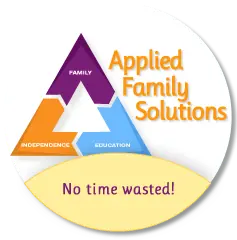Criteria for Autism
299.00 Autistic Disorder
A. A total of six (or more) items from (1), (2), and (3), with at least two from (1), and one each from (2) and (3):
(1) qualitative impairment in social interaction, as manifested by at least two of the following:
(a) marked impairment in the use of multiple nonverbal behaviors, such as eye-to-eye gaze, facial expression, body postures, and gestures to regulate social interaction
(b) failure to develop peer relationships appropriate to developmental level
(c) a lack of spontaneous seeking to share enjoyment, interests, or achievements with other people (e.g., by a lack of showing, bringing, or pointing out objects of interest)
(d) lack of social or emotional reciprocity?
(2) qualitative impairments in communication, as manifested by at least one of the following:
(a) delay in, or total lack of, the development of spoken language (not accompanied by an attempt to compensate through alternative modes of communication such as gesture or mime)
(b) in individuals with adequate speech, marked impairment in the ability to initiate or sustain a conversation with others
(c) stereotyped and repetitive use of language or idiosyncratic language
(d) lack of varied, spontaneous make-believe play or social imitative play appropriate to developmental level
(3) restricted, repetitive, and stereotyped patterns of behavior, interests, and activities as manifested by at least one of the following:
(a) encompassing preoccupation with one or more stereotyped and restricted patterns of interest that is abnormal either in intensity or focus
(b) apparently inflexible adherence to specific, nonfunctional routines or rituals
(c) stereotyped and repetitive motor mannerisms (e.g., hand or finger flapping or twisting or complex whole-body movements)
(d) persistent preoccupation with parts of objects
B. Delays or abnormal functioning in at least one of the following areas, with onset prior to age 3 years:
(1) social interaction,
(2) language as used in social communication, or
(3) symbolic or imaginative play.
C. The disturbance is not better accounted for by Rett’s disorder or childhood disintegrative disorder.
299.80 Pervasive Developmental Disorder, Not Otherwise Specified
This category should be used when there is a severe and pervasive impairment in the development of reciprocal social interaction or verbal and nonverbal communication skills, or when stereotyped behavior, interests, and activities are present, but the criteria are not met for a specific pervasive developmental disorder, schizophrenia, schizotypal personality disorder, or avoidant personality disorder. For example, this category includes “atypical autism” –presentations that do not meet the criteria for autistic disorder because of late age of onset, atypical symptomatology, or subthreshold symptomatology, or all of these.
